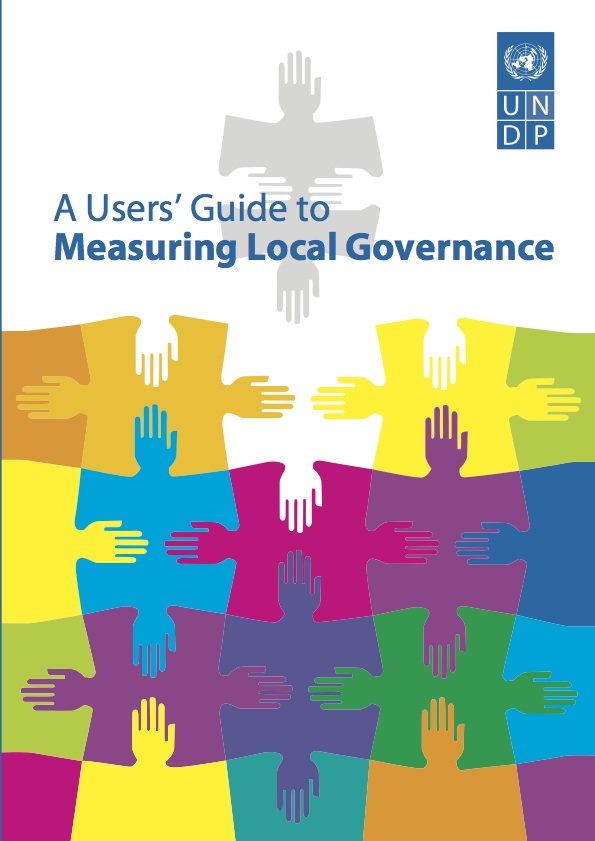 UNDP’s Oslo Governance Center produced this useful guide to measuring local governance, published in 2009. The purpose of the Guide is “to compile existing knowledge and decentralization and local governance measurement and provide a platform for understanding and navigating the array of assessment tools that exist…”
UNDP’s Oslo Governance Center produced this useful guide to measuring local governance, published in 2009. The purpose of the Guide is “to compile existing knowledge and decentralization and local governance measurement and provide a platform for understanding and navigating the array of assessment tools that exist…”
This report is a treasure chest of references to frameworks, tools and approaches, and would be a great starting place for anyone considering doing an assessment. It includes a wealth of helpful hints for being aware of the diverse stakeholders that are involved.
The 160-page report is based in part on interviews with sixteen of the key thought-leaders in the field. It presents four fictional case studies and reviews the relevant focus and utility of 22 different measurement tools.
UNDP takes a holistic approach to decentralized governance analysis, described in a 2004 paper. They identify eight “universal priorities” including:
- Capacity-building and institutional reform;
- Participation through inclusiveness and empowerment of citizens
- Recognition and involvement of diverse constituencies
- Non-discrimination
- Reinforcing Representation with direct citizen participation
- Adoption of new forms of participation: neighborhood ocuncils, e-democracy etc.
- Publicly-available records
- Matching devolution of functions with capacity building.
(Note – these appear to be reflected in our own framework here, which is a relief!)
The authors identify four main objectives to undertaking a local governance assessment:
- Diagnosing problems and their scope,
- Monitoring activities
- Evaluation of the results and outcomes of activities
- Dialogue with citizens and communities
The report notes that all assessment frameworks are based on normative, value-oriented, prescriptive principles, and they cite four different ones, although they all appear to be very similar in their inclusion of effectiveness, transparency/openness, participation etc.
It underscores the importance of including indicators that focus on poverty and gender, although they note that “very few assessments… use measures that are explicitly focused on the poor.”
The report groups the tools into three categories, and conducts a comparative analysis of the tools. We will not attempt to summarize their findings, but we will present their list here along with links — most of which have changed since the 2009 publication of this report.
Category 1: Comprehensive local governance assessment approaches based on multiple stakeholder perspectives
- Urban Governance Index (UN-HABITAT)
- Local Governance Barometer (Impact Alliance) – The previous weblinks have gone inactive. We are currently meeting with PACT about this, and will publish a separate report soon.
- Good Governance for Local Development – GOFORGOLD Index (Afghanistan) (Note – this is a new link – it was not available at the time the UNDP report was published.)
- Local Democracy Assessment Guide (International IDEA)
- Indicators of Local Democratic Governance (Tocqueville Research Centre & OSI). The links listed in the report are no longer active. We’ve contacted the author.
- Methodological Guidelines for Local Governance Analysis (UNDP). The links listed in the report are bad – this is a new link.
- Governance Index (Indonesia, Kemitraan – Partnership). New link.
- Measuring Municipal Performance – MIDAMOS (Paraguay – in Spanish)
- Observatory of Democracy in Central America: System of Legal and Institutional Governance Indicators for Central America (Centro Estudios para el Futuro) – The cited website has disappeared – we will try and find it!
- Desde lo Local – Strategic Decentralization for Local Development (Mexico) – Links have changed, and a recent forum has been held – we will look into it!
- Council of Europe’s Guide to Developing Well-Being & Progress Indicators with Citizens – Application of the Governance Module in Timisoara (Romania). New Link.
Category 2: Local governance assessments based on citizen (or single stakeholder) perspectives
- Citizen Report Cards (Public Affairs Centre, India)
- Social Audit of Local Governance (Bosnia and Herzegovina) – This goes to the tool, but not to information about it.
- Social Audit of governance and delivery of public services (Pakistan). Updated link.
- Local Governance Self-Assessment (Bangladesh)
Category 3: Local governance and performance self-assessments by local government institutions
- Governance for Local Development Index – GOFORDEV Index (Philippines)
- Assessments Informing Performance Based Grant Systems (UNCDF) –
- Local Governance Performance Management System (Philippines)
- Index of Responsibility, Transparency and Accountability (Macedonia) (new link)
- Standards of Municipal Transparency (Chile)
- Local Integrity Initiative (Global Integrity)
- Methodology for the Assessment of Capacity of Municipalities in Turkey and the Western Balkans to deliver basic services (UNDP)


Leave a Reply
You must be logged in to post a comment.